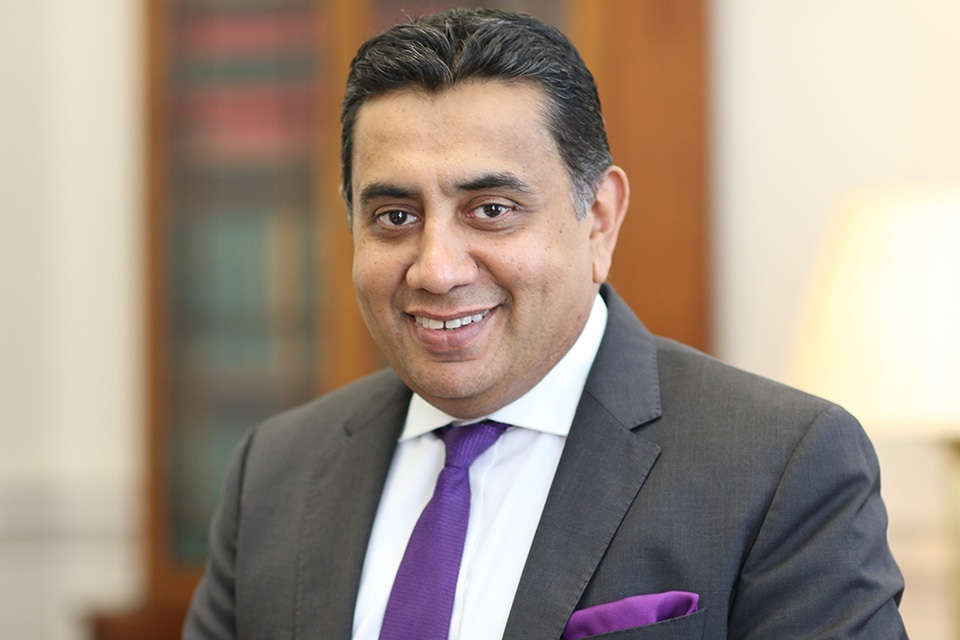38th Universal Periodic Review of human rights: UK closing statement
Lord Ahmad of Wimbledon welcomes conclusions of the 38th Universal Periodic Review.

The Universal Periodic Review (UPR) is a unique peer review mechanism of the Human Rights Council aimed at sharing best practice. As a strong supporter of the UPR process, we have participated and raised priority human rights concerns in all reviews since the process began in 2006. This session reviewed 14 States: Belgium, Denmark, Estonia, Latvia, Mozambique, Namibia, Niger, Palau, Paraguay, Seychelles, Sierra Leone, Singapore, Solomon Islands and Somalia.
Modern Slavery and Human Trafficking
The UK Government continues to push for global cooperation and action in the fight against modern slavery and human trafficking. 2021 marks the tenth anniversary of the UN Guiding Principles on Business and Human Rights, which the UK strongly supports. Internationally, the UK promotes implementation of the Guiding Principles through the drawing up of National Action Plans. We also encourage other governments to take practical action to protect human rights in the business sphere, and ensure access to justice and remedy for victims of rights abuses. The UK was the first state to produce a National Action Plan, which sets out our expectations of businesses to respect human rights. We are backing these expectations with action. The UK has also committed to strengthening the Modern Slavery Act 2015 to tighten transparency requirements on large businesses, and extend those requirements to the public sector.
During the 38th UPR session, our recommendations ranged from calling for robust legislative developments and National Action Plans, to providing greater education to first responders and officials, and improved victim support. We also continued to recommend ratification of the 2014 ILO Forced Labour Protocol, which is an important instrument to tackle all forms of forced labour and provide protection to victims.
UN Treaty Bodies
Since 2017, we have consistently made the recommendation to ‘adopt an open, merit-based selection process when selecting national candidates for UN Treaty Body elections’ to most states. These expert bodies are a central part of the UN human rights system, charged with monitoring the implementation of human rights conventions in states which have signed up to them. The UK continues to advocate strengthening the quality, independence and diversity of Treaty Body membership.
Belgium
The UK commends Belgium’s strong commitment to promoting and protecting human rights, this includes the positive steps taken by the Belgium Government to promote gender equality internationally and tackle racism through the introduction of a National Action Plan. We are also pleased by Belgium’s endorsement of the UK’s Call to Action to End Forced Labour, Modern Slavery and Human Trafficking to achieve SDG 8.7 and welcome the steps taken towards establishing a Federal Human Rights Institute. The UK calls on Belgium to make further progress to establish and operationalise a Federal Human Rights Institute that is fully compliant with the Paris Principles, provide further training to first responders to identify victims of trafficking and to provide necessary financial and human resources to first line actors, specialised shelters and the judiciary.
Mozambique
The UK welcomes the government of Mozambique’s request for support to ensure their security forces are trained in International Humanitarian Law, and International Human Rights Law. The Mozambique government must ensure that all allegations of human rights violations and abuses are fully investigated, and perpetrators, both State and non-State actors, are held to account. We call on the government of Mozambique to criminalise all forms of modern slavery, including child prostitution, and amend the Law on Preventing and Combatting the Trafficking in People 2008 to bring the legal definition of ‘trafficking’ in line with international standards. The UK further urge Mozambique to provide its National Human Rights Commission with sufficient financial and human resources to enable effective implementation, monitoring and enforcement of the human rights framework.
Singapore
The UK is pleased that the Government of Singapore has ratified the Convention on the Elimination of All Forms of Racial Discrimination, and has made efforts to improve women’s rights. As we do with all countries, we continue to urge the government of Singapore to impose a moratorium on executions as the first step towards abolition, end judicial corporal punishment, and end detention without trial. The UK calls on Singapore to implement comprehensive legislation to protect people from discrimination on the basis of age, disability, sex, sexual orientation, race, religion or belief and to adopt legislation against Modern Slavery, including reporting provisions for corporations, ensuring recruitment fee caps are enforced, greater flexibility to move between employers and statutory hours of rest and leave for foreign domestic workers.
Somalia
The UK is concerned by the absence of significant progress made by the Government of Somalia to address its human rights challenges. We note the steps taken by Somali leaders to prepare for a return to talks on the electoral process and urge them to come to agreement and hold elections as soon as possible to protect the rights of the Somali people. We commend Somalia for establishing a legal framework to protect journalists, but remain concerned at continued high levels of harassment and arbitrary detention. Forced marriages and female genital mutilation remain pervasive, and the UK calls on Somalia to adopt the 2018 Sexual Offences Bill urgently. To ensure those most in need are able to receive humanitarian assistance, the UK urges Somalia to pass legislation allowing humanitarian organisations to operate within a clear framework and enable the Federal Government of Somalia to work towards the removal of illegal checkpoints and multiple demands of taxation.
The UK urges all countries under review during this session to give full and serious consideration to the UK recommendations. We encourage them not only to accept them, but also to implement all the recommendations in a timely and comprehensive manner. We look forward to the formal UPR adoption at the UN Human Rights Council in September 2021.